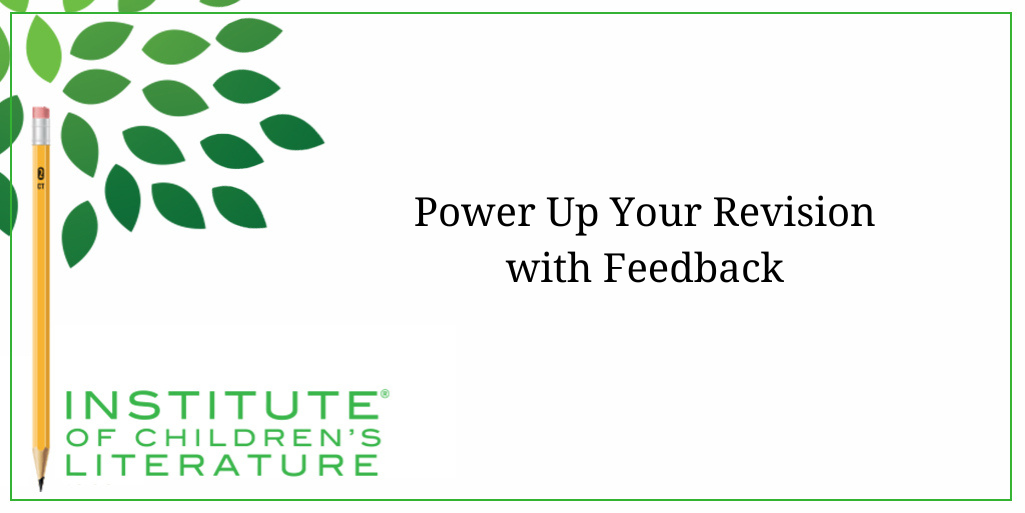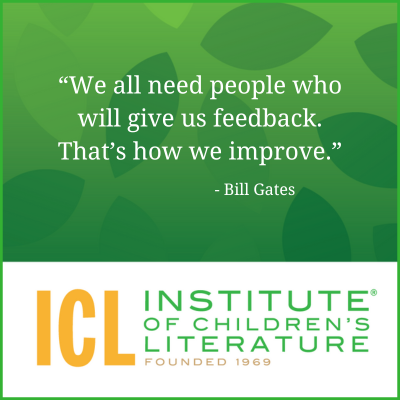
5 Ways Writers Can Prep for 2025 Goal Setting
Before we roll on to the new writing year, let’s harness our optimism for the blank slate before us and prepare for our 2025 Goal Setting just for writers.

Revision is often a solo activity, but revising your own work comes with hidden challenges. Too often we read what we know we meant to write rather than what is on the page, so we miss things. 
Though too many voices speaking to you about your work can be confusing, having none but your own is often not the best choice either. It’s easy to underestimate the incredible value of feedback at some point in the revision process. Feedback offers you a reader’s perspective early while you can still change. Too often negative book reviews and post-publishing reader feedback do nothing but kill word of mouth and depress the writer. But early feedback can say what your readers would eventually say. That kind of feedback gives you options. You can listen to it. You can make changes based on it. Or you can decide the feedback isn’t for you.
The sad truth is that I don’t always write as clearly as I think I do. I’m a huge fan of the parenthetical aside, which adds complexity to a sentence. Equally, I can get caught up in understatement, assuming readers are coming into the story with the same core knowledge I have. And finally, my attempts at humor can add confusion. As a result, I sometimes get editorial feedback that says, “I’m not sure what you’re trying to say here.” Thankfully, I don’t get it so often that my editors are annoyed with me, but I get it often enough to know clarity for me as a writer may not match clarity for my reader. And I benefit from being told where my prose isn’t clear. Confusion will kill reader connection, so I never want to be confusing.

The human brain loves repetition, rhyme, patterns, and rhythm. This is great because it makes reading more fun. But it’s equally true when you write as when you read. If we aren’t aware of this or not paying attention, unfortunate things can happen. Without some guidance, your brain will inject these things at entirely the wrong time. For example, you’ll fall in love with having a character tilt their head to one side, or roll their eyes, or duck their head, and soon, lots of characters are making the same gesture, or one character is making it constantly. When you’re writing, it’ll feel right because it’s ticking your brain’s love of repetition. But for the future reader, it will be too much or in the wrong place. It will result in distracting writing that you won’t catch because it continues to feel right to you.

I might have a character try to coax the answer out of their exhausted brain. And then my writing brain falls oddly in love with that. So, within the same chapter a couple of other people will start coaxing. And if I don’t catch that, my editor will, but it’s so much better if my editor never knows I had that brief love affair with a word.
Early feedback during the revision process will help me catch those overused words. Or overused character-specific actions. Again. Sometimes I realize this is the perfect spot for my character to raise her chin and lean toward another character so I can signal to the reader that a bout of stubbornness is coming on. But the problem arises when the poor girl is jutting her chin every other paragraph. She might be stubborn but if it’s turning into a tic, it’s not conveying what I meant it to. And it’s distracting. And reader feedback during revision will help you to avoid that.
I mentioned before that I tend to like parenthetical asides. If you’ve read many of these essays, you’ve probably noticed that. It’s my pet sentence pattern. It may not be yours. I have seen writers fall for all kinds of sentence patterns. For example, some writers love starting a sentence with an -ing phrase:
Slipping silently through the weeds, Jack crept toward her.
Hearing an unexpected rustle behind her, Bisa stiffened in fear.
Meowing in greeting, Jack jumped into her arms and purred.
There is nothing wrong with that sort of sentence structure, as long as it doesn’t become your pet structure. The same goes for my beloved parenthetical asides. But when writers overuse them, they become attention-getting for structure instead of for content. As a result, they make it harder for readers to understand. And when a writer gets attached to these kinds of structures, it can be hard to notice they’re causing a problem. Again, an outside reader can offer feedback that helps you realize when a weakness like that has crept into your prose.
Have you ever read a book and spotted what appears to be an egregious error, and wondered how the writer and editor missed such an obvious flaw? It’s because they weren’t reading like a reader. They were too close to the project. They were too focused on other elements during revision. It is incredibly hard to throw off writer thinking or even editor thinking and dive into a work totally as a reader. It’s monumentally harder when the work you’re trying to get into is one you created.
Manuscripts benefit from some time to themselves. You set the manuscript aside and do absolutely nothing with it for a while. Days, weeks, or even months of drawer time will give you some distance and let you begin to read the work as a reader instead of a writer. It’s not perfect, but it helps. Still, sometimes deadlines don’t allow you to have any drawer time. That’s when feedback from a trusted reader is invaluable. Your reader doesn’t need drawer time. They always bring objectivity to the table. They aren’t always right, by the way. Feedback is most valuable for pointing out a spot where there is a problem, even if what the feedback says about the problem isn’t right.
There is no one way to collect feedback on a project, and all feedback is potentially useful. One way to think about feedback has to do with the source’s experience and connection to the field of publishing. For example, feedback can come from professional editors or professional critiques that you pay for.
If you are paying for feedback, it needs to come from someone with recent experience in the genre and age group the piece fits. For example, when you submit your manuscript through our Manuscript Critique Service, it is paired with an instructor who is specializes in that genre. Professional feedback is best when you feel a manuscript is very close, but you recognize it has problems you simply cannot identify. Professional feedback is often pricey, so you want to be sure you’re working with someone who can communicate about problems clearly.

As with professional feedback, the feedback from critique groups is often best given by people with some experience writing for the same age group or in the same genre. When I’ve received feedback from writers whose work is solidly in a different genre or age group, I will sometimes get suggestions that work in the genre they write for, but not in the one I’ve written for. But with any feedback, all suggestions must be considered carefully before being implemented or rejected.
A final source of feedback is often from people who are neither writers nor industry professionals but are instead passionate readers. Thus, feedback can come from trusted “beta readers.” This is often someone who doesn’t write at all but reads extensively in the genre you write. Beta readers are often best if they are part of the intended audience for the book.
These kinds of beta readers will often not talk specifically about plot arcs, foreshadowing, or flashbacks using those specific terms. They may be talking about these elements, but they won’t always be able to call them out in the terms we would use. So, there is some interpretation that the writer must do when using beta readers. A beta reader may talk about how slow the story started because they had a problem with your use of a prologue, or they may mention how the shifting timeline was confusing without actually saying the word flashback, or they may talk about how the ending was unsatisfying or felt rushed when really they’re bothered by some plot choices you made. With a beta reader, they most often point you to problems, but it’s up to you to figure out what you did that resulted in the unsatisfying reading experience they point out.
Few of us enjoy hearing we made mistakes. And sometimes feedback points out some really stupid mistakes (or maybe that’s just the feedback I’ve gotten). All feedback will do the most for you if you follow these steps:
If you want the best feedback, you must be a person who gives respect for the effort put into trying to help you. That’s a skill you’ll call on so many times in your career. So let the feedback you receive help you to build it.
With over 100 books in publication, Jan Fields writes both chapter books for children and mystery novels for adults. She’s also known for a variety of experiences teaching writing, from one session SCBWI events to lengthier Highlights Foundation workshops to these blog posts for the Institute of Children’s Literature. As a former ICL instructor, Jan enjoys equipping writers for success in whatever way she can.

Before we roll on to the new writing year, let’s harness our optimism for the blank slate before us and prepare for our 2025 Goal Setting just for writers.

Writers can be thin-skinned when it comes to getting feedback on their work. Let’s look at 4 ways to positively deal with constructive criticism!

Rejection is part of the territory when it comes to being a writer. Today we offer reflection for writers to help redirect your efforts after a rejection.
1000 N. West Street #1200, Wilmington, DE 19801
© 2024 Direct Learning Systems, Inc. All rights reserved.
1000 N. West Street #1200, Wilmington, DE 19801
© 2024 Direct Learning Systems, Inc. All rights reserved.
1000 N. West Street #1200, Wilmington, DE 19801
© 2024 Direct Learning Systems, Inc. All rights reserved.
1000 N. West Street #1200, Wilmington, DE 19801
© 2025 Direct Learning Systems, Inc. All rights reserved.
1000 N. West Street #1200, Wilmington, DE 19801
©2025 Direct Learning Systems, Inc. All rights reserved. Privacy Policy.
2 Comments